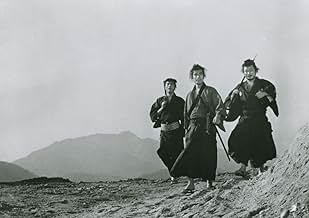Ajouter une intrigue dans votre langueWhen poor peasants kidnap a magistrate's daughter to coerce him into reducing their unfair taxes, a wandering ronin decides to give them some help.When poor peasants kidnap a magistrate's daughter to coerce him into reducing their unfair taxes, a wandering ronin decides to give them some help.When poor peasants kidnap a magistrate's daughter to coerce him into reducing their unfair taxes, a wandering ronin decides to give them some help.
Avis en vedette
Of course, there are Gosha's typical studied camera angles and compositions (you see some interesting "moving camera" work, which significantly predates the attempts of "pioneering" US directors). However, "Sanbiki no samurai" also showcases Gosha's ability to tell a story through facial expressions, rather than simply relying upon dialogue.
This is all film-school wankery. The bottom line is that "Sanbiki" is a gripping chambara flick, with a solid morality tale disguised as a cynical amorality tale. (Note that a common theme through many Japanese "chambara" is that of cynical ex-samurai who ultimately decides to risk life and limb for some hopeless but noble "little guy" cause.)
This theme was repeatedly, um, emulated by the likes of Sergio Leone with his spaghetti westerns. However, my point is that such tales are just plain entertaining. The three actors playing the samurai also turn in great performances.
Viewers new to Hideo Gosha may wish to start with "Goyokin" or "Hitokiri" (a/k/a "Tenchu"), but if you've seen those two already (or if they're already checked out), then this is still a definite movie to catch!
Very similar to Seven Samurai in terms of style and themes, this is another take on the familiar story of cynical samurais helping out poor peasants in their fight against the oppression of the rich and powerful. Three lowly peasants kidnap a daimyo's daughter and demand a tax reform that will ease the economic burden for all the peasants in the nearby villages. It's all well plotted and interesting for the duration with great performances all around and near superb swordplay action. Gosha's two Samurai Wolf films as well as Sword of the Beast would make ideal companion pieces as an entry point to the director's output. Fans of Kurosawa's jidaigeki work are likely to appreciate it just as well.
The story is familiar. The Samurai feel sorry for the poor peasants and one even gives up his luxurious life in the Magistrate's service to fight the evil tax collector that is bleeding the peasants dry.
It's the film debut for Hideo Gosha, and he does a great job of mixing samurai fighting and humor and concern for the poor into an enjoyable film that was beautifully shot.
I am certainly going to look for more of his work.
You may have encountered other examples of this genre and found them underwhelming, but don't dismiss the samurai film altogether before you've seen Hideo Gosha's debut. I guarantee that "Three Outlaw Samurai" will not disappoint.
After a title sequence with a bombastic score, the action begins almost immediately in this film. A wandering Samurai stumbles upon a hostage situation - a few pathetic peasants (not too different from the ones in Seven Samurai) are holding the daughter of an aristocrat hostage in the hope that he would waive taxes. After observing the bumbling peasants and their failed negotiations with the aristocracy for a while, the cynical Samurai decides to join the fight on the peasants side.
While watching this film, it struck me that the Samurai attitude towards life is not too different from the cowboys in spaghetti westerns or protagonists in Noir thrillers. They are very cynical and are always watching how the situation unravels. But they often put their neck on the line in the end.
The treatment and portrayal of women in this film is quite hilarious and politically incorrect.
I liked the way the director balanced the different aspects of the film - the film is a mix of cynical tongue in cheek humor and relentless action while also foregrounding themes like samurai honor and the plight of peasants.
The plot, like a Noir film is quite complicated.
(7.5/10)
Le saviez-vous
- AnecdotesHideo Gosha's directorial film debut.
- Citations
Sakon Shiba: [Threatening to kill the Magistrate; his daughter physically intervenes] For his victims' sake, I can't allow him to live.
Aya: Please!
Sakon Shiba: Move, or I'll kill you!
Aya: Kill me, then. No matter what he's done, I'm still his daughter.
Sakon Shiba: [the Magistrate breaks free and runs for it, but Shiba deftly cuts off his top knot with a quick thrust of his sword] Let the lord see you in disgrace. Let the peasants see you in disgrace.
- ConnexionsFeatured in Best in Action: 1964 (2020)
Meilleurs choix
- How long is Three Outlaw Samurai?Propulsé par Alexa
Détails
- Durée1 heure 34 minutes
- Couleur
- Mixage
- Rapport de forme
- 2.35 : 1
Contribuer à cette page
































